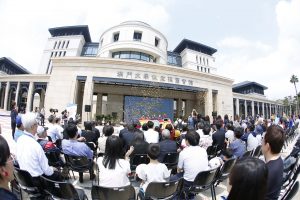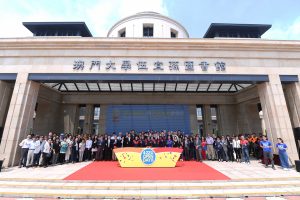The University of Macau today (22 April) held the Opening Ceremony for the UM Open Day and Smart Campus. In the future, UM will use various advanced technologies, including cloud computing, virtulisation, and internet of things, to connect the university’s teaching, research, management, security, and dining systems to campus resources and application systems, in order to realise smart management. UM Rector Yonghua Song hopes that the innovative people trained through the smart campus project will eventually become leaders in the creation of a smart city in Macao.
In his speech, Rector Song said that in creating a smart campus, UM needs to go through three stages. The goal for the first stage is informationisation. The goal for the second stage is training innovative people; and the goal for the third stage is creating an eco-system to involve faculty and students in the creation of a smart campus. He added that students have many creative ideas, so the university will encourage student participation. So far, the university has already received relevant proposals from some students. He hopes that the innovative people trained through the smart campus project will eventually become leaders in the creation of a smart city in Macao.
UM’s smart campus project hopes to achieve four objectives. First, improving teaching quality by launching Massive Open Online Courses, introducing various quality programmes from both at home and abroad, encouraging students to study the course content online beforehand, innovating offline teacher-student interaction with smart teaching tools, and allowing teachers to monitor student’s learning progress through complete data on teaching and learning. Second, creating an interactive campus by establishing a big data sharing platform to allow faculty and students to use their creativity and contribute their wisdom in everyday life. UM will become the first university in Macao and Hong Kong to launch an open data API platform. Third, strengthening practice and innovation. UM established the Institute of Collaborative Innovation in 2017 in order to promote technology incubation and transfer, smart city APPs design, and innovative entrepreneurship. Fourth, improving administrative performance.


